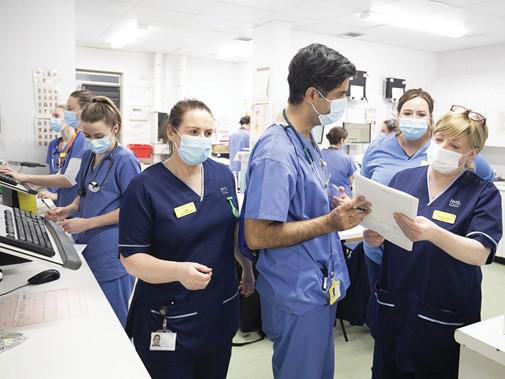It’s a new year and we’re nearly halfway into a new session and committee, following elections last summer. In previous blogs, we set out priorities to deliver on registrar wellbeing as well as setting out the case for rebuilding public health through restored funding and pay equity and restoration.
You’ve played your part in securing important steps towards pay restoration, in every part of the UK now. As a new pay round approaches, it’s vital to make sure your details on our system are up to date.
We’re also acting on rising competition ratios and consultant recruitment freezes, working with the specialty registrars committee in the FPH (Faculty of Public Health) to push for more training posts and a review of the application system while lobbying to ensure there will be consultant posts for registrars completing training.
Our member density is in a strong position and public health registrars continue to shape the BMA’s important work on health policy. Recent policy wins include the start of restoration of the public health grant in England this year and the Tobacco and Vapes Bill in UK Parliament.
As part of the shift to the term ‘resident doctors’ by the BMA, we will be proposing our preferred nomenclature as public health registrars, regardless of background, at conference this year – we will no longer be called trainees or juniors. Our local organising has also significantly improved, with wins on rest days, facilities and out-of-hours pay across the UK.
A particular success has been on work schedules and exception reporting for non-residential on-call work in England. Several members and reps have now agreed local guidance and used work diary exercises to secure exception reporting access and work schedules that better reflect their on-call work, resulting in pay increases. We know several regions have outstanding issues; we are always here to help you and have now put work diary advice and examples in the documents of our local campaign guidance.
We are also contributing to the UK resident doctors committee’s negotiations on exception reporting reform, to develop national solutions and guidance.
Our guidance is there to help you and your colleagues organise locally and campaign on what matters to you. You can also join the LNC for your lead employer (or subgroup) and get training and accreditation. Local reps are crucial for local wins. We offer a free, confidential 24/7 counselling line and peer support service open to all doctors and medical students on 0330 123 1245.
Our priorities for this session include:
- developing a position statement on healthcare public health, public health specialists and population health
- responding to the rising competition ratios for public health and GP/public health dual training
- helping members locally to secure fair study budgets and fair pay for non-residential on-call work across the UK
- contributing to BMA public health policy and resident doctor work on training reviews and exception reporting
- growing our membership and organising capacity.
Snapshot of our specialty
We’d also like to share the results of our survey of public health registrars across the UK. With a 25% response rate, 75% of all responses were from trainees working full time, and 25% were LTFT (less than full time). Of those who were LTFT or considering LTFT, key considerations for doing so were family/care commitments, personal choice and burnout.
The majority of respondents (90%) planned to complete their public health training. However, those contemplating leaving cited issues including inadequate training, feeling isolated or undervalued, and pay concerns. Feedback highlighted gaps in structured teaching, with some feeling the training programme leans more towards unstructured experience rather than specific consultant-relevant skill and career development.
Career destinations were highly varied across settings and domains. Reasons for choosing career destinations were mainly impacted by pay, availability of hybrid/remote working and employment location. For those considering moving abroad, lifestyle, wellbeing and pay were motivating factors. It is clear many areas of public health will continue to struggle with recruitment and retention until pay erosion and disparities are resolved.
Most registrars (58%) reported rotational training as being positive in public health. While most registrars appreciate rotational training, some were concerned about placement length and cost, especially for national placements, and relocation expenses were seen as inadequate. There were also mixed feelings on hybrid working, which, while reducing travel costs, was seen by some as affecting their wellbeing and sense of connection with other registrars on the training programme.
This survey underscored registrars’ preferences for a supportive training environment and recognition of their diverse expertise. This appears to be reflected in their post-training career intentions, with support for flexibility in their work, financial stability, and a clear career progression structure. The findings will shape our work, and we’ll share them with the FPH amongst others.
Finally, our work on global health and advocacy continues, and we’ve continued to strengthen our links with the FPH and trade unions representing registrars employed on Agenda for Change. Our annual conference where we hear from speakers and form our policy is on 17 March and is free for BMA members – register here. We’re also planning on another open meeting this summer.

